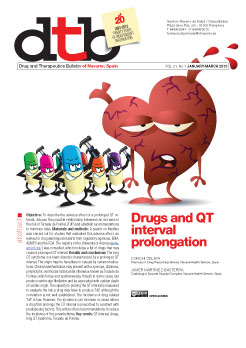Drugs and QT interval prolongation
The long QT syndrome is a heart disorder characterized by a prolonged QT interval. The origin may be hereditary or caused by certain medications.
Clinical manifestations may present with a syncope, dizziness, polymorphic ventricular tachycardia otherwise known as Torsade de Pointes, which may end spontaneously, though in some cases can produce ventricular fibrillation and be associated with sudden death of cardiac origin. The capacity to prolong the QT interval is measured to evaluate the risk a drug may have to produce TdP, although the correlation is not well established. The incidence of drug related TdP is low. However, the incidence can increase in cases where a drug that prolongs the QT interval is prescribed to a patient with predisposing factors. This article offers recommendations to reduce the incidence of this proarrhyhtmia.
Authors:
- Conchi Celaya. Pharmacist. Drug Prescribing Service. Navarre Health Service, Spain
- Javier Martínez-Basterra. Cardiologist. Navarre Hospital Complex. Navarre Health Service, Spain


